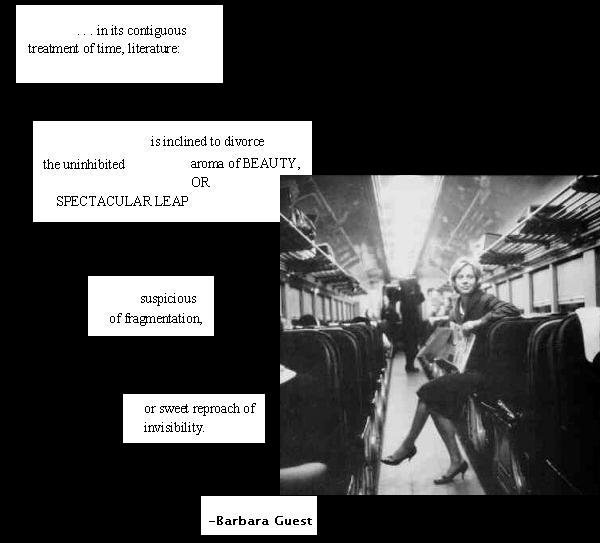Hi, folks, I'm going to post something here (even though I was holding back) with the hope that this may get some ideas generated here that we can then explore here as an online community and then bring back with us into the class room. Many may say that Reader-response criticism recognizes the reader as an active agent who brings a work to life, completing a text's meaning through interpretation. Okay, this seems fine. But what if the reader instead collaborates with the poet, acts on some level as writer, and instead of interpreting the poem's meaning, completes the poem, notices aspects of the poem, becomes awe-struck by the poem, considers incorporating into one's own quotidian discourse aspects of the poem's form and concerns? In other words, what if the reader pretty much leaves the poem alone, working neither in a workshop setting to change the poem nor interpret/translate the poem. What if the reader simply communes with the poem? Remember that Emily Dickinson once wrote that "If I feel physically as if the top of my head were taken off, I know that is poetry." What is it that takes the top of your head off?
I notice in workshop a sort of knee-jerk tendency to say, "Well, I like/do not Iike X..." or "Well, if I were writing the poem, I'd do X..." or "Well, this reminds me of that time in 5th grade when...". What if instead we attempted to note things about the poem's form, the poem's process, listening to the poem's music, experiencing the poem's architecture? In our readings we've so far been introduced to practically an entire language with which to speak about a poem, but I notice a tendency to shy away from that discourse. Why is that? What if instead of saying "I don't like this line," we instead could say something like "Well, Williams has said that a line of poetry ought to...". I've noticed however folks responding to the essays on poetics by saying things like "I just don't get it," or "I just can't read this." Well, why is that?
I'd like you to try to think about the above questions and maybe some of the following:
What is it that's posing the difficulty? Is it that the essays sometimes ulitilize non sequiturs? Is it that the essays sometimes come up with stipulative definitions of key terms? What is it? Ask yourself how long you typically spend reading a particular essay on poetics? Is that long enough? Do you use a pen while reading? Do you ever do any online research of the author to try to situate that author in a context?
What may be some benefits of rethinking some of your habits of attention? Take the tops of your heads off, folks. It may be scary, but that's okay. You'll get through it.
Let's go!
Scott
Church of the Light by Tadao Ando

Tuesday, May 1, 2007
Subscribe to:
Post Comments (Atom)


15 comments:
What "it" is that takes the top of Emily Dickinson's head off is an astounded instantaneous sensation of exhilaration/delight when she sees a poet sucessfully cast, in language/thought, the profundity of his sense-of/sensitivity-to the physis.
That is certainly a specific and beautifully articulated formulation of Dickinson's adage. I wonder how you came to that specificity? Have you read her correspondence? I have, but it has been quite a while and I do not recall her ever elucidating an empirical claim about exactly what it was that takes the top of her head off. I could be, and probably are, wrong, but I would like to know how you came to see Dickinson's shrewd comment in that light.
Lucas,
No, I have never read Dickinson's correspondence. I just thought about her comment ever since the first day of class, when it appeared in the syllabus. "Taking the top of one's head off..." is a very graphic phrase, and I just totally put myself into that notion, so the statement is more properly about what takes the top of my head off !
Duane (and all),
okay, so, we're back to a central problem: Dickinson only ever uses the pronouns "I" and "my" when referring to the poetry lobotomy, but I think at the time those pronouns probably stood for a more general "one" in a way that they can not now in our age, for such generalizations are considered essentialist and idiotically subjective. Thus, we're back to a central problem: By reading all of this poetics history: Pound, Olson, etc., we're trying to determine once and for all what "poetry" is (and how to make it), but can I only ever say, "I like this and I don't like that?" Do we have to leave it up to subjectivity and just concede that poetry is whatever anyone says it is on whatever day one chooses to say it? What's the purpose of poetics then? Can we not find some common "essential" credentials that qualify some words on the page to gain access to the Poetry Room and some other words on the page to be locked out? Or is that too elitist? Is elitism in all honesty, in the end, a somewhat worthwhile thing? What is such "elitism" in fact "democratic"? For what is a democracy anyway? Is it just any on' thing? What are the qualities of a democracy, of citizenry? Or do such questions lead down a slippery slope of something just too plain ugly to talk about? Or is this exclusion not actually elitist at all? Is it something else? What are Poetics anyway? When do words on the page become citizens of Poemland?
Just questions...
Scott
Poetry is an established language game, and it proceeds by long established rules which, once ignored in the name of an "avant garde", constitute one as seriously autistic.
Well, yes, I'm recommending that we challenge or disregard those "long established rules" and assumptions in the hope of new possibilities. "Why not? Why not give something else, some other paradigms a go?"
One cannot make a go of maintaining one is constituting poetry via a conscious effort to discard central mechanisms of interpersonal communication. One cannot successfully disregard "about". One cannot successfully practice autism, those persons are set aside and protected;- their contribution is at best idiosyncratic and minimal. One cannot establish new paradigms of linguistic efficiency by discarding/disregarding given efficient modes of communication; one must employ given means of communication in an attempt to constitute something new. One cannot communicate via uncommunicative linguistic structures. One cannot establish new paradigms of communicativeness via being uncommunicative, one can, thereby, only establish babbling nonsense. You cannot unplug from established means of language-communication and remain within the realm of language. Your poetry is an apparent language which has, in fact, abandoned language, because, it has abandoned communication.
Nihilistic autistic absurdity.
Yes, Scott, I very clearly understand the position you are presenting. However, there is one centrally cardinal consideration which your position does not address, and, that is that poetry is language. Poetry is language. Poetry is not a rock or a tree or a bird, i.e., it is not a being-in-itself which is what it is in a completely concrete co-incidence with itself. Poetry is not a thing in itself, it is language, and as language it is, in spite of every possible effort one may attempt to make it otherwise, referential/significatory/usage/communicative. Until poetry is not language, which it cannot ever not be, it is about X. If it is not about X it is not poetry. Even the essentially autistic structures of language poetry is about autistic unintelligibillity/nonsense/handsome babble, and that is all that it is.
Thought is language and language is thought. Poetry is language. Therefore poetry is thought. One can choose to make that thought either intelligible, or unintelligible/autistic. However is it complete news to me that language is for the sake of communicating unintelligible statements. Language is the communication of intelligible propositions, and, that is, therefore, what poetry is. Poetry cannot be, is not, babbling nonsense. One may call one's babbling nonsense poetry, but, that is purely delusional. If you choose to continue to babble beautiful nonsense, fine. The top of Emily's head was never taken off via linguistic nonsense; it was taken off via beautiful intelligibility.
"I am nobody, who are you? Are you nobody, too? Then that's a pair of us!"
-Emily Dickinson
A few questions:
1. Who established the rules of poetry? Where are they? I am having a hard time finding them.
2. What does the binary impersonal/personal mean? Did we not demolish the binary perception of the objective/subjective with Modernism? Or is it still struggling to survive like so many modes of archaic babble?
3. Can communication be seen? If so what does it look like? Is it vibrating as violently as everything else? Is it vibrating so violently that our eyes only catch the data input information instead of the whole; like an image, a texture or a sound?
4. When autopoesis occurs communication is personified. Ha ha. Sorry, what I mean to say is that communication puts together the things we call human beings. Communication personifies human beings, right? In this mode poetry is a tree, right? It seems to be much more active and living than the cogs we call human beings, correct?
I would love someone to clear all this up for me. The whole of Post-Modernism is still cracking away at it, maybe there answer is right here on this blog.
"To pretend, I actually do the thing: I have therefore only pretended to pretend."
-Jacques Derrida
The whole of Post-Modernism is still cracking away at it, maybe their answer is right here on this blog.
What was it that you are all arguing about?
Anthony,
We are debating the viability/possibility of the position that poetry need not be about anything.
1. Who established the rules of poetry? Where are they? I am having a hard time finding them.
Lucas,
In so far as poetry is an establised language-game, and, in so far as sub-species of poetry are established language-games, the rules thereof are discernable via reading particular ilks of poetry. For example, read Scott's l a n g u a g e poetry and you will see exhibited thereby rules that one merely pursue the possibility of consituting ensembles of beautiful/delightful words totally divorced from sense; usage; aboutness...
3. Can communication be seen? If so what does it look like? Is it vibrating as violently as everything else? Is it vibrating so violently that our eyes only catch the data input information instead of the whole; like an image, a texture or a sound?
Mr. Rivera,
Yes communication can be seen/heard. Surely you see/hear the lines which I now posit in response to your queries ! In this particular instance "it" looks like, sounds like, our English language-game. Language vibrates radically violently and in every other possible vibratory way ! Via the power of the pen I can, indubitably, shake Earthlings.
4. When autopoesis occurs communication is personified. Ha ha. Sorry, what I mean to say is that communication puts together the things we call human beings. Communication personifies human beings, right? In this mode poetry is a tree, right? It seems to be much more active and living than the cogs we call human beings, correct?
Lucas R.,
The "things we call human beings" are not things, they are, more accurately/properly, nothings/nothingnesses, and, the nothingnesses that are human beings are the sole originative source of "poetry".
Post a Comment